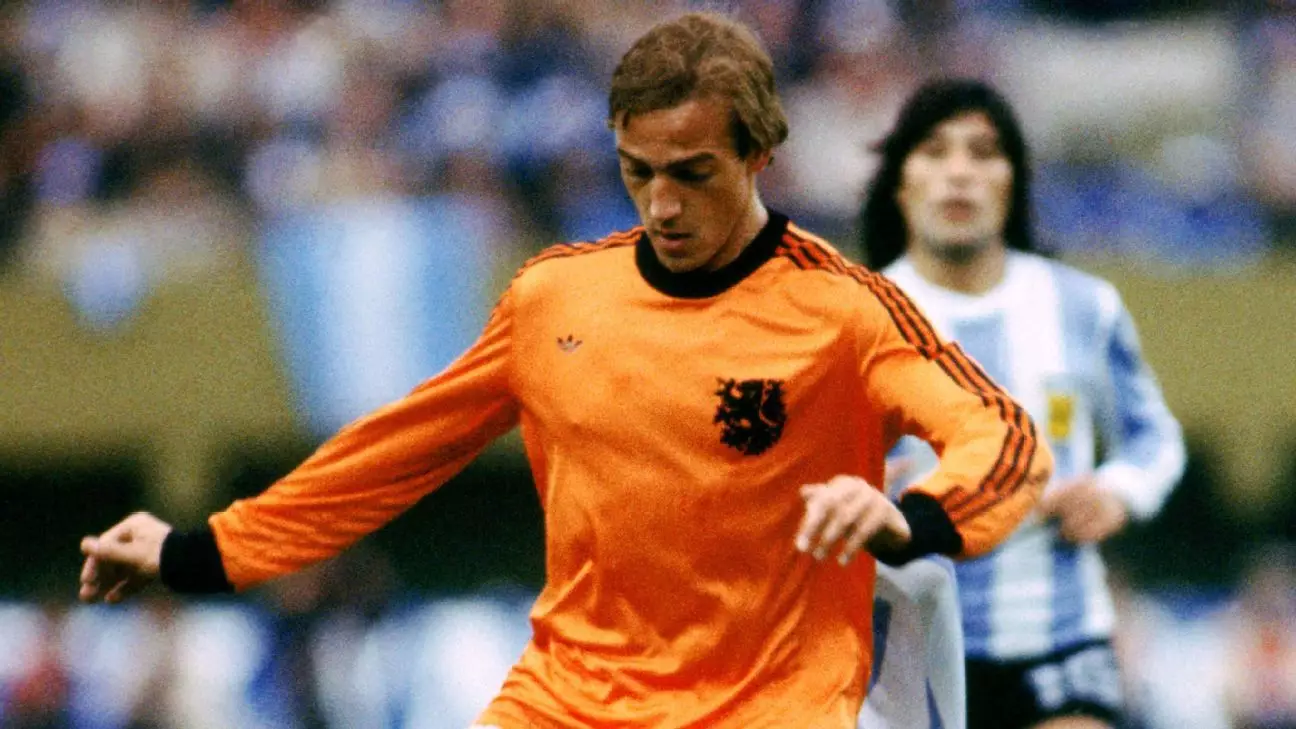The world of football mourns the loss of Johan Neeskens, one of the most prominent figures from the Netherlands’ golden era in the 1970s. The Dutch football legend passed away at the age of 73 while participating in a coaching initiative in Algeria, an endeavor organized by the Royal Dutch Football Association (KNVB). A cause of death has yet to be disclosed, but the impact of his departure resonates deeply through the community of players, fans, and football historians alike. The KNVB’s heartfelt statement captured the sentiment, acknowledging not just Neeskens’ prowess on the pitch but also his character off it, highlighting him as a “compassionate, driven and wonderful person.”
Neeskens’ football career is marked by both brilliance and heartbreak. He was part of the legendary “Clockwork Orange” teams that came so close yet ultimately fell short in two consecutive FIFA World Cup finals. In the 1974 tournament, Neeskens made headlines by scoring an early penalty that put his team ahead against West Germany. However, despite their dominance and recognizable “total football” style, the Dutch team succumbed to a 2-1 defeat in Munich. Reflecting on this tough loss, he once remarked, “The most beautiful football doesn’t always win.” Neeskens emphasized the paradox of sport—style does not always guarantee success, a sentiment that resonates with many great athletes who have experienced the sting of defeat.
The following World Cup in Argentina saw the Dutch team grapple with the same fate. After an intensely fought match, they lost 3-1 in extra time to the hosts. Neeskens’ contributions in these tournaments were invaluable; he accumulated 12 World Cup appearances, scored 17 international goals, and played a total of 49 matches for his country, leaving an indelible mark on its football narrative.
While international tournaments brought heartbreak, Neeskens enjoyed immense success at the club level. As a key component of the Ajax team during the early 1970s, he celebrated remarkable victories, including three European Cups, a precursor to the renowned Champions League. His exceptional playing style, combined with the tactical acumen of his coaches, enabled Ajax to dominate European football during this period. Neeskens also had notable stints with clubs like Barcelona and the New York Cosmos, where he left a lasting impression on fans and fellow players alike.
In recognition of his contributions, notable clubs, including Ajax and Barcelona, have expressed their sorrow over his passing. Ajax honored him as a club legend, while Barcelona, referring to him as a “blaugrana legend,” acknowledged the significance of his career within their storied history.
Beyond statistics and accolades, Neeskens valued the strength of collaboration within a team more than individual glory. During a reunion of players from the 1974 World Cup final, he articulated his belief that the success of a team relies on its collective harmony. “You need each other on the field. You can only become a champion as a team,” he asserted. Herein lies an extraordinary lesson not only for athletes but for anyone participating in collaborative endeavors: unity fosters triumph.
After retiring from football, Neeskens continued to contribute to the sport he loved, transitioning into coaching roles both for the Dutch national team and Australia. This dedication to fostering talent and sharing his wealth of knowledge speaks volumes about his commitment to football, extending his legacy beyond the pitch.
Johan Neeskens is remembered not just for his exceptional skill and accomplishments but also for his character, humility, and undying love for the game. His legacy, woven into the fabric of Dutch football, will continue to inspire future generations. As fans, players, and coaches reflect on his life, they are united in their grief, celebrating an extraordinary individual who embodied the heart and soul of football. Rest in peace, Johan Neeskens. The game will never forget the brilliance and compassion you shared with all who had the privilege to witness it.

